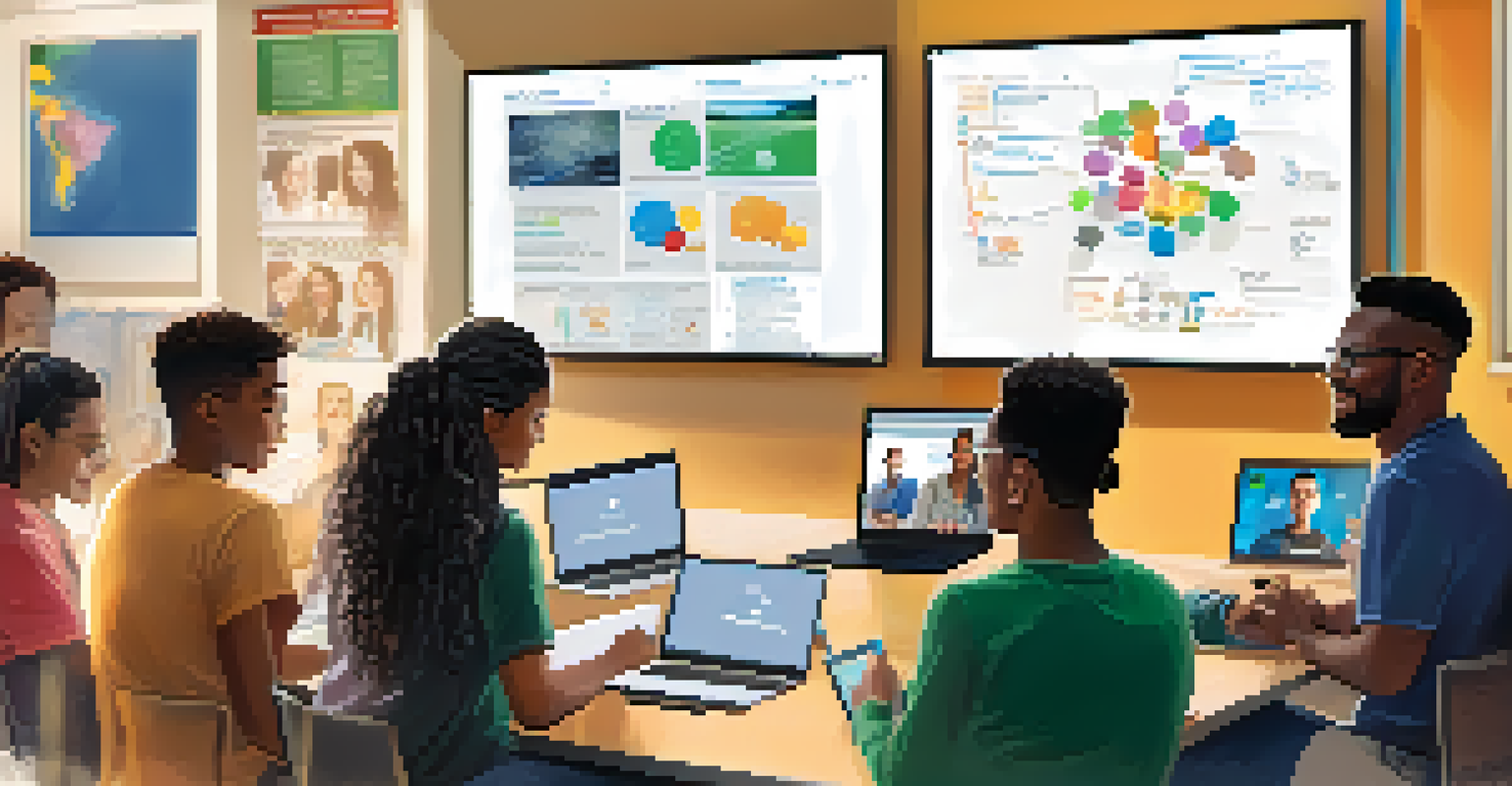Carving Education: The Shift to Online Learning Platforms

Understanding the Shift to Online Learning Platforms
In recent years, the landscape of education has undergone a dramatic transformation, largely driven by advancements in technology. Online learning platforms have emerged as a viable alternative to traditional classroom settings, making education more accessible than ever. This shift is not just a trend; it reflects a fundamental change in how we approach learning, offering flexibility to students and educators alike.
Education is the most powerful weapon which you can use to change the world.
For many, the convenience of attending classes from anywhere with an internet connection has opened doors that were previously closed. Imagine a student in a remote area, who now has the opportunity to learn from top instructors without the need for travel. This accessibility is reshaping the demographics of the classroom, allowing diverse voices and experiences to contribute to the learning environment.
Moreover, this online shift has encouraged the development of innovative teaching methods. Educators can now use multimedia resources, interactive tools, and real-time feedback to enhance the learning experience. This evolution not only caters to different learning styles but also prepares students for a digital world that demands technological proficiency.
Benefits of Online Learning Platforms
One of the most significant benefits of online learning is its flexibility. Learners can set their own schedules, allowing them to balance education with work, family, or other commitments. This flexibility is particularly advantageous for adult learners who may have different responsibilities compared to traditional students.

Additionally, online platforms often provide a wealth of resources at students' fingertips. From recorded lectures to interactive quizzes, the variety of learning materials available online can cater to different preferences and enhance understanding. Students can revisit lessons at their convenience, ensuring they grasp the content fully before moving on.
Flexibility Enhances Learning
Online learning platforms provide students with the flexibility to set their own schedules, allowing them to balance education with personal and professional commitments.
Finally, the online learning environment fosters a sense of community among students from various backgrounds. Discussion forums, group projects, and virtual meetups enable learners to connect, collaborate, and share insights, creating a rich educational experience that transcends geographical barriers.
Challenges of Online Learning Platforms
While the advantages of online learning are numerous, there are also challenges that both students and educators face. One major hurdle is the requirement for self-discipline and time management. Without the structure of a physical classroom, some students may struggle to stay motivated and keep up with their coursework.
The beautiful thing about learning is that no one can take it away from you.
Technical issues can also impede the learning experience. Not everyone has access to high-speed internet or the necessary devices, creating a digital divide that can hinder participation. This inequality can affect students' ability to engage fully with the material and their peers, leading to frustration and disengagement.
Additionally, the lack of face-to-face interaction can make it difficult for some learners to feel connected to their instructors and fellow students. Building relationships in an online environment requires intentional effort, and the absence of in-person cues can sometimes lead to misunderstandings or a sense of isolation.
The Role of Technology in Online Education
Technology plays a pivotal role in the effectiveness of online learning platforms. Tools such as video conferencing, learning management systems, and interactive software facilitate communication and engagement between students and instructors. These technologies make it possible to replicate many aspects of the traditional classroom experience while still offering the benefits of flexibility.
Moreover, advancements in artificial intelligence and machine learning are paving the way for personalized learning experiences. Platforms can now analyze individual progress and tailor content to meet each student's needs. This level of customization enhances engagement and ensures that learners receive support where they need it most.
Community Fosters Engagement
Building a sense of community in online learning helps students feel connected and engaged, enhancing their overall educational experience.
Finally, technology allows for the continuous improvement of educational content. Instructors can easily update materials to reflect current events, trends, or advancements in their fields, ensuring that students receive the most relevant and accurate information possible.
The Future of Online Learning Platforms
As we look to the future, the role of online learning platforms is expected to expand even further. With the growing recognition of remote education's potential, many educational institutions are integrating online elements into their traditional curricula. This hybrid model combines the best of both worlds, providing flexibility while maintaining valuable in-person interactions.
Innovations such as virtual reality (VR) and augmented reality (AR) are also set to revolutionize online learning. These technologies can create immersive learning experiences, allowing students to explore complex concepts in a more engaging and interactive way. Imagine studying history by virtually walking through ancient ruins or conducting science experiments in a simulated lab environment.
Furthermore, as global connectivity improves, we can anticipate an increase in cross-cultural learning experiences. Students will have the opportunity to collaborate with peers from around the world, broadening their perspectives and understanding of different cultures and viewpoints. This interconnectedness will enrich the educational experience and prepare learners for a globalized workforce.
The Importance of Community in Online Learning
Building a sense of community is crucial for the success of online learning platforms. When students feel connected to their peers, they are more likely to engage with the material and participate actively in discussions. Creating opportunities for collaboration and interaction can help foster this sense of belonging in a virtual environment.
Many platforms now incorporate social features, such as discussion boards and group projects, to facilitate communication among students. These tools encourage learners to share ideas, ask questions, and support one another, turning the online experience into a more communal endeavor. In this way, students can learn not just from their instructors but also from each other.
Technology Personalizes Education
Advancements in technology, such as AI, allow for personalized learning experiences that cater to individual student needs and progress.
Additionally, educators play a vital role in cultivating community. By being present, responsive, and encouraging interaction, instructors can create an inclusive atmosphere where students feel valued and motivated to contribute. When students know they have a supportive network, their confidence grows, and their overall learning experience is enhanced.
Conclusion: Embracing the Shift in Education
The shift to online learning platforms represents a significant evolution in education, one that offers numerous benefits while also presenting unique challenges. By embracing this change, educators and students can harness the power of technology to create a more flexible, accessible, and enriching learning experience.
As we navigate this new educational landscape, it's essential to remain mindful of the importance of community, engagement, and support. By prioritizing these elements, we can ensure that online learning is not just a substitute for traditional education but an opportunity for growth and connection.

Ultimately, the future of education lies in our ability to adapt and innovate. As we continue to explore the possibilities of online learning, let’s approach this journey with an open mind and a commitment to making education better for everyone.